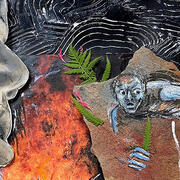
In our second discussion as part of the 10-week fall series, “Weather Reports: The Climate of Now,” held September 27, environmentalist, author, and HDS Writer-in-Residence Terry Tempest Williams spoke with Bernadette Demienteff, an Indigenous activist for the protection of the Arctic National Wildlife Refuge (ANWR) and the director of the Gwich’in Steering Committee.
Their conversation examined the relationships between Indigenous peoples, sacred land, and twenty-first century corporate and environmental communities. Respondent questioning was provided by Eric Descheeni, a Diné environmentalist and former member of the Arizona House of Representatives who served as the founding co-chair of the Bears Ears Inter-Tribal Coalition.
The Gwich’in have deep roots with the Porcupine Caribou herd, historically moving with them and orienting themselves around the Porcupine calving grounds in the ANWR’s coastal plain (which they call Izhik Gwats’an Gwandaii Goodlit, or The Sacred Place Where Life Begins). Today, about 9,000 Gwich’in live in 13 villages along the Porcupine migration route. The coastal plain lies above oil reserves, and extractive interests, at odds with Gwich’in advocates, have been trying to begin drilling for oil there for several decades now.
Dementieff is a forceful advocate for the ANWR. She is deeply charismatic and shares her story beautifully, vulnerably sharing how climate change and colonialism’s cultural legacy have affected her, her communities, and the spaces through which she moves.
Throughout the conversation, as Dementieff spoke about the importance of protecting the ANWR from oil not only for the caribou, which would likely be more the focus of traditional Western conservationism but also for the Gwich’in who depend on it for their livelihood, she brought human rights and environmental issues together with remarkable grace.
Dementieff’s words to Williams and her conversation with Descheeni, where they each drew on their own experiences of indigeneity, were intensely powerful in their own right. I found that they gained a bit of extra meaning, though, for being placed in a conversation series that grapples with the range of issues that it does: Last week we spoke about fire in the West; next week we’ll be speaking with Morgan Curtis and brontë velez about environmental justice and diverse, intergenerational dialogue in the environmental movements.
Across all of these conversations, with speakers for different communities and different approaches to both climate collapse and human-climate relationships, I’m finding a sense of community in grappling with these urgent issues that I haven’t before.
I said this last week, but it bears repeating: If you haven’t yet, we hope you’ll join us in that community. We invite you join us for the next conversation, “The Climate of Relationships and Intersectionality,” on Monday, October 4.
—by Owen Yager, MTS candidate